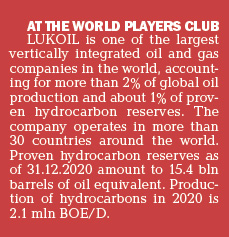Projects
LUKOIL left Kumkol for the Caspian shelf
The largest Russian private oil company LUKOIL has sold its stake in the Turgai Petroleum joint venture developing the Kumkol field in the Kyzylorda region of Kazakhstan.
JV, plant and aircraft for Ministry of Oil and Gas

LUKOIL was one of the first investors in the oil and gas industry of independent Kazakhstan. On December 2, 1993, two years after the collapse of the Soviet Union, an agreement on the joint development of fuel and energy complexes of the two states was signed between the Governments of the Republic of Kazakhstan and the Russian Federation. Based on this document, in the spring of 1995, the Minister of Oil and Gas Industry Nurlan Balgimbayev signed a large-scale agreement with the president of the Russian company Vagit Alekperov on cooperation in the production, use and processing of hydrocarbons in Kazakhstan.
The parties agree to establish a joint venture at Kumkol, conduct joint geological exploration in the Caspian Sea, and build a joint venture for the production of motor oils on the basis of the Atyrau refinery. LUKOIL also promises Kazakhstan to solve the problem of supplying the Shymkent refinery with raw materials (in exchange for participation in the plant's corporatization) and, after commissioning its gas fields in Uzbekistan, solve the issue of gas supply to southern Kazakhstan. And as a cherry on the cake, LUKOIL declares its readiness to transfer to Kazakhstan a share in the construction project of the Yuzhny oil refinery near Novorossiysk. To this Black Sea port, it is planned to supply oil from the Tengiz and Karachaganak fields via a new pipeline.
At the end of April of the same year, the Prime Minister of the country Akezhan Kazhegeldin signed a decree on the creation of Southern Fuel and Energy Complex JSC (SFEC), where the state-owned Yuzhneftegaz, the Shymkent refinery, the enterprises of the state company Kazakhgas and the Zhambyl HPP are transferred. According to the government's plans, SFEC should become the core of a new financial and industrial group with the participation of Karatau Holding, Kazkommertsbank and LUKOIL.
And on August 17, an agreement is signed on the creation of the Kumkol-LUKOIL joint venture. The participants' shares – Yuzhneftegaz and the Russian company – are distributed in the proportion of 50 to 50. The next day, during a personal meeting, Vagit Alekperov hands over a letter to Nursultan Nazarbayev from Russian Prime Minister Viktor Chernomyrdin, in which he expresses gratitude "for the trust placed in LUKOIL JSC in implementing large-scale projects for the development of the oil and gas complex of the Republic of Kazakhstan and ensuring the effective operation of enterprises for the extraction and processing of phosphorus raw materials in the Karatau basin."
Almost simultaneously, there are publications in the Russian press about a luxury executive class aircraft based on the YAK-42, which Vagit Alekperov allegedly gave to Nursultan Nazarbayev, but the CEO of LUKOIL Kazakhstan, Nigmat Imamniyazov, refutes this: "The plane is not a gift to Nazarbayev. An agreement was signed with the Ministry of Oil and Gas of Kazakhstan on the sale and leasing of this aircraft. It can't be just given away. Otherwise, it would be a banal bribe. LUKOIL did not come to Kazakhstan from the back door, but openly, for a long time and seriously."
However, the plans for broad cooperation were mixed up by the mass privatization that started in 1996 in Kazakhstan – Yuzhnefnegaz was in its first wave. The new owner of the state-owned shares of the enterprise (and the share in the joint venture, respectively) was the Canadian company Hurricane Hydrocarbons. On June 27, 2000, at the general meeting of shareholders, it was decided to rename Kumkol-LUKOIL into Turgai-Petroleum Closed Joint Stock Company. On May 17, 2005, the company, following the requirements of the legislation, was transformed into Turgai-Petroleum JSC.
In 2005, Hurricane, after a massive attack by the Kazakhstani inspection authorities, a series of scandals and criticism in the press, sold its share in PetroKazakhstan (the new name of Yuzhneftegaz) to CNPCI, a subsidiary of the China National Oil and Gas Corporation. Later, the Chinese cede part of their share to KazMunayGas, but these corporate storms safely bypass LUKOIL's share in Turgai Petroleum. And in 2020, the Russians themselves decide to abandon it. Why?
The fact is that the Kumkol field is mature, its peak of production has long been passed, and every year it gives fewer hydrocarbons. Over the past seven years, Turgay Petroleum's oil production has fallen four times: if in 2013 it produced 1.655 mln tons, then in 2019 it produced only 0.4 mln tons. Such volumes are simply not interesting for the Russian oil giant, and it turned its eyes to the Caspian shelf.



